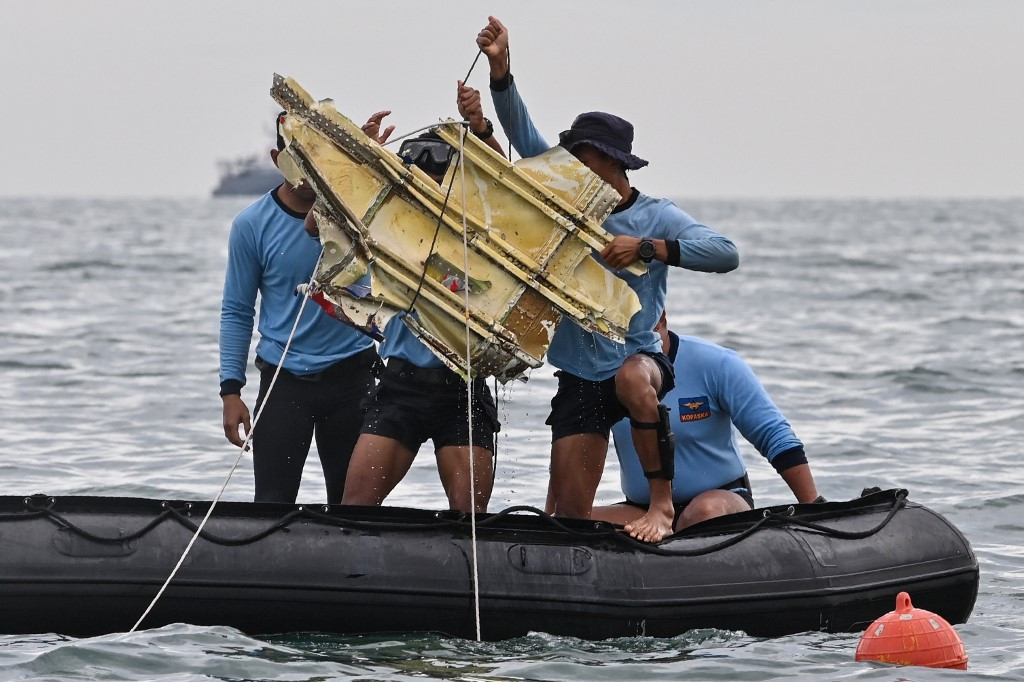Popular Reads
Top Results
Can't find what you're looking for?
View all search resultsPopular Reads
Top Results
Can't find what you're looking for?
View all search resultsAnother sad day for aviation
While we share the grief of the families of the crash victims, the accident serves as a grim reminder to double efforts to improve safety standards as the core value of our aviation industry.
Change text size
Gift Premium Articles
to Anyone
I
ndonesia started the new year with another tragic airplane crash, as Sriwijaya Air flight SJ182 plunged into the Java Sea just four minutes after taking off from Soekarno-Hatta International Airport in Cengkareng, Banten, on Saturday afternoon.
The Boeing 737-500 was carrying 40 adults, seven children and three babies, in addition to six active crew and another six crew as passengers on the flight heading to Pontianak, West Kalimantan.
While we share the grief of the families of the crash victims, the accident serves as a grim reminder to double efforts to improve safety standards as the core value of our aviation industry. Only over two years ago the crash of Lion Air flight JT619 captured international attention because it involved a brand-new Boeing 737-8 MAX. On Dec. 28, 2014, Air Asia flight QZ8501 flying from Surabaya, East Java, to Singapore, crashed into the Karimata Strait near Pangkalan Bun, Central Kalimantan, with 162 fatalities. Previously, Adam Air flight KI574, crashed into the Makassar Strait near Polewali, West Sulawesi, on Jan. 1, 2007, killing all 102 people on board.
Indonesia had become a pariah state in terms of aviation safety with so many accidents and incidents, leading the European Union and United States to ban Indonesian airlines from operating in their airspaces. The ban has since been lifted thanks to various investments in technology and human resources, as well as updating regulations.
It is still too early to say what caused the Sriwijaya accident, although it shares a similar flight profile with those of the previous accidents. It will take months, if not years, before investigators find out what went wrong with the Sriwijaya flight.
In aviation safety management, accident analysis is focused on the 5M: man, machine, medium (weather), mission and management. What matters in aviation is that the aircraft is airworthy with proper maintenance management.
However, the US Federal Aviation Administration (FAA) did issue an emergency directive in July 2020 for the Boeing 737 family of aircraft types to pay attention to aircraft that have been stored or parked up because of the COVID-19 pandemic.
The FAA said that stored aircraft could have corrosion that could lead to a dual-engine failure.
There are many airlines, including in Indonesia, still operating the Classic type, the 737-300, -400 and -500 models, as well as the NG type, the 737-600, -700, -800 and -900 models.
As the pandemic rages on, the government has been forced to limit the public’s mobility, which includes a reduction in the number of flights. Many aircraft have been parked as demand has slumped.
It is mandatory for the Transportation Ministry to ensure all required maintenance work is conducted properly according to the latest standards. No cutting of corners can be allowed to save some money in this cutthroat industry.
Airlines provide vital transportation links in an archipelagic country like Indonesia, therefore the government should pay more attention to the industry. Indonesia might not have the budgetary power of the US to bail out its airlines, but it could have facilitated the aviation industry so as to put maintenance of aircraft at the top of priorities.
The sky is vast, but there is no room for error.










